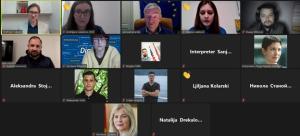Online-Seminar
Details
The third PolitiKAS debate on the topic “Significance of lobbying – practice examples from Serbia and the Netherlands“, took place on March 23rd 2021 on the ZOOM platform.
Duško Krsmanović, Strategic Advisor and founder of the company Flagship spoke about the differences between institutional and corporative lobbying, about different lobbying techniques and about competencies which make a lobbyist competitive.
Wim van de Camp, Lobbyist, long-standing Member of the European Parliament and Special Advisor to the Commissioner for Transport Adine Valee spoke from the perspective of the Netherlands, which is on the third place when it comes to the contacts of countries and when it comes to its responsiveness and influence in the EU.
The debate was moderated by Strahinja Subotić, Senior Researcher in the Centre for European Policies (CEP).
What is lobbying? What types of lobbying are there?
When defining lobbying Mr Krsmanović and Mr Van de Camp agreed that lobbying includes influencing the making of decisions with the use of strategic thinking, information management and assessment of political interests when it comes to a certain topic.
“In times of crises, especially when it comes to industries which have to endure significant losses, the lobbyists have to work in order to help those industries become the focus of attention of decision makers. By pointing out the impact of such an industry upon the broader socio-economic image of the society, the lobbyist helps determine that industry as a priority industry for getting support”, Mr Krsmanović pointed out.
Mr Krsmanović and Mr Van de Camp said that it is important to understand the difference between public and private lobbying or between what is known as institutional and corporative lobbying. Mr Krsmanović mentioned that “corporative lobbying is a strategic way of managing the communication between the public and private sector. Those communications are set up in such a way that they can help a certain company or certain industry branches to use the communication and relations with the external environment in order to improve their strategic position. The external environment can refer to countries or to the competition”.
“That means that we help certain companies on the Balkan market, which is less predictable and more subject to external shocks, to act better in that chaos of information, initiatives or in unpredictable circumstances. In ideal situations companies can influence the dynamics and the content of the regulations which are to be adopted, by gathering certain initiatives which can be temporary or permanent in order to help represent the interest of one industry to the decision makers in a country”, Mr Krsmanović said.
Speaking from the perspective of the Netherlands, Mr Van de Camp said that “if we take a look at the politics of the Netherlands in Brussels, there are 72 to 73 topics of interest for the state and they are all connected and constant work and dedication are required in order for those interests to be realized”.
He talked about the lobbying in Brussels as especially interesting and somewhat unique. Lobbying in Brussels includes the communication with 27 different cultures, with 21 different languages, a series of interdependent interests, national groups and the inertia of European institutions. All of that required the lobbyist to have an extraordinary cultural sensitivity, which makes this type of lobbying very specific.
What are the skills of a good lobbyist?
“In crisis situations the need for services of those who can establish communication and come up with information in a short period of time is increased”, Mr Krsmanović said.
Regardless of whether we speak about the private or public lobbying, the speakers agreed that the skill which makes a lobbyist good is his ability to make an all-encompassing analysis of the situation.
Mr Krsmanović said also that it was necessary to have “general but good knowledge of economic and political relations in the country, of macroeconomic indicators, of the social and technological situation in the region, of the relations between the EU and China etc. All of that knowledge needs to be part of the message, which is being communicated to the stakeholders. By reaching out to the stakeholders you can achieve the effect of moving a certain topic from point A to point B or you can put a non-existent topic on the agenda”.
The main skill which makes a lobbyist good is the ability to communicate well and that is why it is necessary to work constantly on the active improvement of communicational skills and on connecting with other people. The ability of active listening, the analytical ability and the ability to manage information are essential in the lobbying process.
Recommendations for the improvement of lobbying capacities of Serbia
When speaking about the potential for the improvement of lobbying capacities of Serbia, Mr Krsmanović mentioned the Law on Lobbying of the Republic of Serbia which was adopted in 2019. He pointed out that “the reason for the lacking functioning of the law in Serbia has scientific reasons, since the effects analysis hasn’t been done sufficiently. In order for the Law on Lobbying to be good it is necessary to have adequate implementation of anticorruption laws”.
Mr Van de Camp pointed out that in order to represent the interests of Serbia abroad or more concretely in Brussels it would be helpful to have a Serbian business club in Brussels. He also said that it would be useful to have a database about Serbs living and working in Brussels. It is also necessary to have excellent diplomats and experts in different areas who would maintain contacts and who would be in communication with a large number of people. “Knowledge and networking are sufficient for the representation and realization of one’s interests”, Mr Wim van de Camp concluded the debate.




